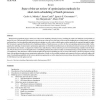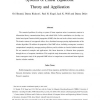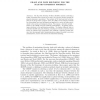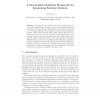142
click to vote
JAIR
2006
15 years 2 months ago
2006
A decision process in which rewards depend on history rather than merely on the current state is called a decision process with non-Markovian rewards (NMRDP). In decisiontheoretic...
108
click to vote
CCE
2006
15 years 2 months ago
2006
There has been significant progress in the area of short-term scheduling of batch processes, including the solution of industrial-sized problems, in the last 20 years. The main go...
122
click to vote
CORR
2008
Springer
15 years 2 months ago
2008
Springer
The canonical problem of solving a system of linear equations arises in numerous contexts in information theory, communication theory, and related fields. In this contribution, we ...
108
click to vote
CORR
2008
Springer
15 years 2 months ago
2008
Springer
The canonical problem of solving a system of linear equations arises in numerous contexts in information theory, communication theory, and related fields. In this contribution, we...
103
click to vote
COR
2010
15 years 2 months ago
2010
The Max-Min Diversity Problem (MMDP) consists in selecting a subset of elements from a given set in such a way that the diversity among the selected elements is maximized. The prob...
140
click to vote
CPAIOR
2005
Springer
15 years 7 months ago
2005
Springer
Abstract. We present an algorithmic framework for integrating solution methods that is based on search, inference, and relaxation and their interactions. We show that the following...




